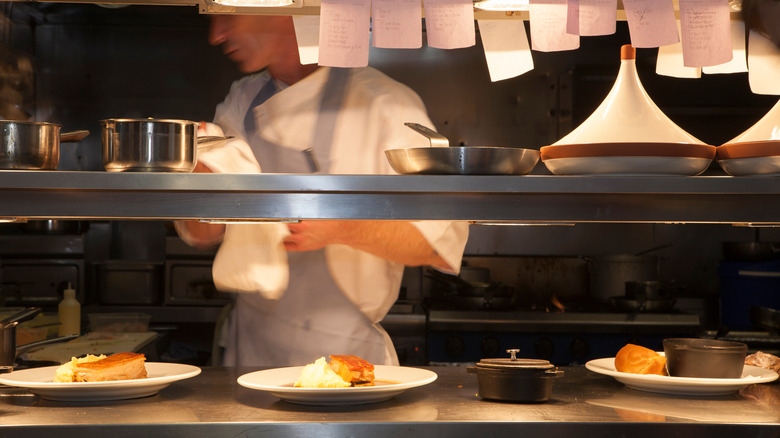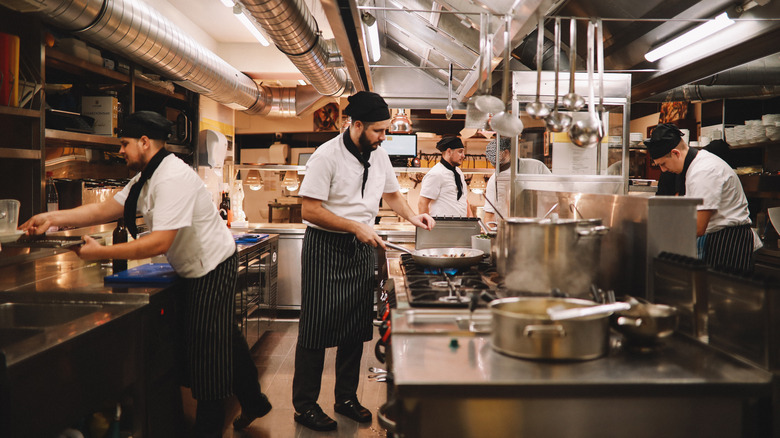What It Means When A Restaurant Dish 'Dies On The Pass'
For those that have worked in restaurants, or perhaps just enjoy the casual chaos of "The Bear," there are some kitchen slang terms that might stand out. Some of these are pretty self-explanatory, such as calling out "heard" to acknowledge someone's request or instruction, or saying "behind" to let someone know you're behind them. Yet, other phrases that are barked in a professional kitchen might not be so obvious to the uninitiated.
For example, no chef wants to hear that a dish is "dying" or has "died on the pass," as this means that it sat out for too long and has lost quality or freshness. A dead dish will need to be set aside, tossed out, or redone, making it a waste of precious time in a busy kitchen.
The phrase is a combination of two separate slang terms. "Dead" describes the dish or drink that is past its prime, and the "pass" is the pivotal area of a kitchen where finishing touches are applied, order tickets checked, and servers or food runners can pick up the ready dishes. Some kitchens have a person charged with managing this process, responsible for "running the pass" and monitoring orders as they come in and go out. It's an important area in professional kitchens, providing a space to check order accuracy and facilitate smooth, efficient handoffs.
The many ways a dish can die
There is more than one way for a dish to "die," and a lot of it has to do with temperature. If left out for too long, hot dishes can go cold, or if the kitchen uses heat lamps on their pass, food can dry out or be otherwise spoiled. Kitchens are notoriously hectic environments, especially during busy mealtimes. A server might forget they have an order waiting or get busy tending to other tables, leaving a dish on the pass in danger of dying before they can get it to the customer.
Presentation is key when it comes to the dining experience, and you'd be hard-pressed to find professional chefs who are comfortable serving a subpar meal. Delivering cold spaghetti or a dried-out burger is a quick way to spoil someone's dinner.
Beverages aren't immune to the trials of time, either, though they usually die on a table, bar, or counter rather than the pass. In the same way a dish dies by losing its freshness or presentation, a drink can perish too. For example, a blended drink left out too long will become unpleasantly slushy, or the ice cubes in a craft cocktail can melt and make it watery. And while some beers are best served warm, you might not be eager to drink a lager that's been sitting out for a while and gone flat. In restaurants, quick order turnaround is paramount for drinks and dishes alike.
More kitchen slang to know
You don't need to be an expert on culinary terms to recognize kitchen colloquialisms; in fact, some terms are fairly common and aren't always specific to restaurant work. For example, FIFO stands for "first in, first out" and is a practice that helps ensure quality and avoid the death of dishes on the pass. This principle is used in many industries, such as manufacturing and retail, but is especially important where expiration dates and freshness are a concern. In restaurants, it's a way of prioritizing ingredients and dishes so that they are used or served in the order they were prepared.
Another example is "in the weeds," though it generally isn't a good thing to be in or out of the kitchen. In the restaurant industry, this means the kitchen staff is getting overwhelmed with orders and struggling to keep up with demand, making mistakes and mixups more likely.
Certain French phrases have made their way into widespread kitchen vocabularies as well, such as "mise en place," a term for having all ingredients and tools organized in a chef's work station. This one is a concept that well-run kitchens use to ensure that everything is put back in the right place, ingredients prepped and ready to go. And it doesn't get fresher than food prepared "à la minute," French for "in a minute." This refers to elements of a dish that are made right before being served or used. As anyone whose had a dish or drink die on them knows, fresh is best.



